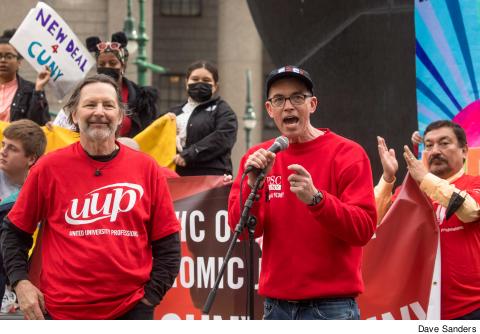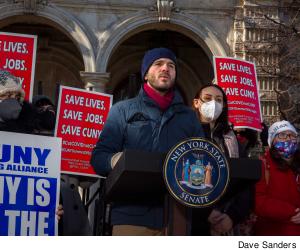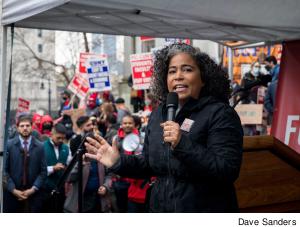The numbers don’t lie: fund CUNY
Editor’s note: On February 7, PSC President James Davis and United University Professions President Fred Kowal testified before the New York State lawmakers in Albany, saying that while Governor Kathy Hochul’s Executive Budget included ambitious funding increases for CUNY and SUNY, it didn’t go far enough. In his testimony below, Davis notes that the New Deal for CUNY, which would make CUNY free and increase full-time faculty and staff, is not just affordable, but fiscally necessary. (The testimony has been edited for print publication.)
 |
We are entering the third year of an international pandemic that continues to impact CUNY communities. Vaccines have lessened the pandemic’s toll on New Yorkers, thankfully, but CUNY students were among those hardest hit by COVID early on in the pandemic. The low-income communities in which they live were disproportionately affected, and tragically so. They lost family members and jobs, and their connections to the campuses diminished as classes went remote. PSC members have worked tirelessly and skillfully to keep the university running, often without clear system-wide guidance from the CUNY administration, resulting in serious health and safety concerns and course cancelations that impede students’ academic progress and leave adjunct faculty without income, and for some, without health insurance. Thank you all for standing by our side during this time.
CUNY students, faculty and staff have persevered during this pandemic, but the pandemic’s effects on our university remain profound and destabilizing. Even today, instructors routinely hear from students coping with the death of a family member or friend.
SEMESTER TRANSITION
Remote instruction, on the scale that we have experienced over the last two years, undermines engagement and jeopardizes student retention. Students without adequate space to study or dependable technology have really struggled. Many have not returned to classes.
We believe CUNY students are generally better served by in-person instruction, advising and counseling. Yet, some students are hesitant to return to in-person classes while COVID is still a threat. Other students who face work and family obligations, a lack of affordable, dependable childcare and long, costly commutes are asking for online alternatives to in person courses. These and other factors have suppressed enrollment at many colleges.
CUNY’s varying responses to low enrollment have left many PSC members concerned about their jobs and have also instilled worry for some adjuncts about their access to health insurance should their classes be canceled. We urge CUNY not to cancel classes. Doing so leaves adjunct faculty without expected income and undermines students’ ability to complete credits they need to graduate on time.
It adds insult to injury when library and computer lab hours are cut because there are not enough staff to keep them open. To reverse the current enrollment trend and to continue to provide a high-quality education, we must furnish the services students deserve and need in traumatic times. CUNY students have a distinctive profile:
- Over 80% of incoming CUNY undergraduates are New York City high school graduates.
- Half of CUNY students come from households with annual incomes below $30,000 and 36% have reported food insecurity.
- 80% are people of color.
- 44% are in the first generation of their families to attend college.
- 13% are supporting children.
- 35% are foreign-born.
Investment in CUNY students, faculty, staff and the communities that we serve will pay dividends for the state. According to a March 2021 report from the Office of the New York City Comptroller, tax dollars for CUNY are a wise investment:
- Nearly 80% of CUNY graduates stay in New York.
- CUNY graduates working in New York State earned a combined $57 billion annually ($67,000 on average) in 2019, $28.6 billion more than they would have earned without a post-secondary degree.
- CUNY graduates working in New York State paid an estimated $4.2 billion in state income taxes in 2019.
- CUNY graduates represent 10% of the private workforce in New York State.
In 2020, the Brookings Institution listed 12 CUNY campuses among the top colleges in the nation that propelled their students toward the greatest upward mobility into the middle class.
In December 2021, a thousand PSC members, CUNY students, community allies and elected officials took to the streets of Queens, marching from LaGuardia Community College to the CUNY School of Law to declare that 2022 is the year for a New Deal for CUNY.
We knew at that march, as we know now, that after years of budgets that did not do justice to CUNY’s Black and brown students, low-income communities and overburdened workers, there is wind at the back of the state’s great institutions of public higher education. The fiscal crisis of the last two years has receded and New York has a strong budget surplus. Governor Hochul is acting decisively to begin reversing the years of austerity funding for CUNY, the state’s most powerful force for economic mobility for low-income New Yorkers, immigrants and students of color.
The governor has committed to an increase of $1.5 billion in new funding for CUNY and SUNY over the next five years. She has proposed new investments in full-time faculty, opportunity programs and childcare facilities. Her capital budget plan recognizes the desperate need for funding to repair or replace CUNY buildings, making them sustainable and safe places in which to work and learn. These increases, which in some cases represent the largest investments in more than a decade, are essential. We applaud them. We also recognize that the chairs and members of these committees have advocated for years for reforms and investments that appear in this Executive Budget. Notable investments in CUNY in the proposed budget include:
- Approximately $120 million in new programmatic and related funding:
- $53 million for 540 new full-time faculty
- $59.6 million for closing the TAP gap, two years sooner than previously planned
- $3.4 million for the SEEK Program
- $4.8 million for the expansion of childcare centers ($3.6 million for senior colleges and $1.2 million for community colleges)
- Expansion of the Tuition Assistance Program (TAP).
- $150 million for CUNY and SUNY to provide support for part-time students
- $5 million to restore TAP for incarcerated individuals
- $3.5 million for the School of Labor and Urban Studies, stabilizing executive funding for the newest CUNY school
- Holding community colleges harmless for enrollment declines. The budget prevents a $35 million reduction in base aid.
Many of the investments outlined in the Executive Budget align with the priorities identified in the New Deal for CUNY (S4461/A5843). This legislation, supported by the CUNY Rising Alliance and introduced by Senator Andrew Gounardes and Assembly Member Karines Reyes, is a $1.7 billion, five-year framework for reversing decades of disinvestment in CUNY.
 |
The bill, which is endorsed by some of New York’s most prominent labor leaders and the Black, Puerto Rican, Hispanic and Asian Legislative Caucus, currently has 65 legislative cosponsors. It seeks to restore CUNY as a tuition-free institution for undergraduates. It would also set minimum staff-to-student ratios for full- time faculty, academic advisors and mental health counselors, establish pay parity for adjunct faculty and rebuild CUNY’s aging infrastructure.
The PSC calls on the legislature to pass the New Deal for CUNY, and we urge you to enact a final budget that will begin to fund the New Deal in fiscal year 2023. To that end, we request that you improve upon the Executive Budget’s investment in CUNY in the following ways:
- Provide an additional $253.9 million in operating aid from the legislature.
- $39.1 million for CUNY community colleges to make 2018–2019 the reference year in the hold harmless provision ($20.7 million) and to fund a $300 per-FTE base aid increase ($18.4 million)
- $78.9 million to hire 171 mental health counselors and 372 academic advisors
- $135.9 million to hire an additional 1,385 full-time faculty (for a total of 1,925, including the 540 new full-time lines provided in the Executive Budget)
- Pass the New Deal for CUNY (S4461/A5843)
- Establish the minimum ratio of full-time faculty to students, by increasing it to 65:1,000 by year five of the governor’s plan for CUNY and SUNY.
- Establish the minimum ratios of 1:1,000 mental health counselors to students and 1:250 academic advisors to students.
- Commit to an undergraduate first dollar tuition-free model at all CUNY colleges.
- For $284 million, New York State can make CUNY community colleges free this year.
- ND4C would make all CUNY fully free in year two.
Between 1990 and 2021, per-full-time-equivalent (FTE) student state operating aid to CUNY senior colleges declined 38% when adjusted for inflation. Since 2008, it declined 18%. The result has been rising tuition, diminished facilities, unmanageable caseloads for mental health counselors and unwieldy workloads for academic advisors, a two-tiered labor system that depends on underpaid adjunct faculty and a severe shortage of full-time faculty.
That CUNY remains such a powerful source of knowledge creation, opportunity and economic mobility during this era of disinvestment is a testament to our faculty, staff and students. PSC members feel a deep commitment to CUNY’s mission to serve “the whole people” of New York. CUNY students are driven to succeed.
We sincerely appreciate the attention public higher education received in Governor Hochul’s Executive Budget. Her five-year plan, beginning with this budget, is a springboard toward fulfilling the New Deal for CUNY. Now, the CUNY community needs the legislature to seize this unique political moment to get us to the finish line and realize the New Deal for CUNY.
CUNY needs more faculty.
Increase the full-time faculty to student ratio of 65:1,000 and professionalize adjunct pay at both the senior and community colleges. This would allow CUNY to hire 5,774 new full-time faculty, which would cost for fiscal year 2023 an increase to the Executive Budget by $135 million and, for the five-year phase in, the total cost would be $542 million.
Imagine a university with more than 253,000 students and over 11,000 full-time faculty. That was CUNY in 1975. In contrast, in 2020, there were almost 4,000 fewer full-time faculty with even more students. Too much of the teaching responsibility now falls on the shoulders of roughly 12,000 adjunct faculty, who, as of last Spring, teach almost 60% of undergraduate courses. This budget is an opportunity to challenge the precariousness that prevails in higher education to the detriment of students and faculty alike.
Hiring new full-time faculty is also a matter of racial justice. A report by the CUNY University Faculty Senate explains that students of color have less access to full-time faculty than white students across New York State’s public senior colleges: “In 2003, both CUNY and SUNY maintained overall ratios of 43 full-time faculty members to 1,000 full-time-equivalent students in the four-year colleges, a number already below national norms for public universities. By 2019, the ratio at SUNY had increased to 49, while the ratio at CUNY dropped to 34.”
Public four-year colleges that serve significant proportions of Black and brown students have lower ratios of full-time faculty to students than their counterpart colleges serving student bodies that are predominantly white. This trend exists in both systems, but it disproportionately affects CUNY.
CUNY students need more professional staff, advisors and mental health counselors.
Hire 171 additional mental health counselors and 372 academic advisors. (Cost for fiscal year 2023: $78.9 million. Total cost for five-year phase in: $78.9 million.)
Last year’s $1 million appropriation from the legislature for mental health counselors was welcome, but students need more permanent access to counselors. Unfortunately, the Executive Budget provided no new funding specifically for counselors or advisors. CUNY needs our legislators to address this need that cannot wait another year.
CUNY students, more than many others, need advisors to help them navigate the labyrinth that is a large university system, as many are the first in their family to attend college. Academic advisors support and expand students’ knowledge in their fields of study, providing essential guidance to keep them on track toward a timely graduation. Yet on some campuses, advisors have caseloads of more than 1,000 students.
Our society’s mental health crisis is not confined to colleges, but CUNY students have been at the center of the pandemic. CUNY’s student-to-mental health counselor ratio is 2,700:1, far worse than the national recommendation of 1,000:1.3. Currently, CUNY is patching together telehealth services with many part- time counselors, also funded with federal pandemic relief, because it does not have an adequate baseline of funds to hire permanent counselors. We urge you to address these gaps in the Executive Budget by providing funding for 171 mental health counselors and 372 academic advisors.
Make CUNY free again.
Eliminate undergraduate tuition and fees at senior and community colleges. (Cost for fiscal year 2023: $284 million in order for the state to make CUNY community colleges free. Total cost for five-year phase in: $1.1 billion.)
 |
New York’s Tuition Assistance Program (TAP) is among the largest state financial aid programs in the nation, benefiting both private and public college students. Roughly 60% of CUNY students receive Federal Pell Grants, and a very small percentage of CUNY students qualify for New York’s last-dollar Excelsior Scholarship.
The state’s funding model for public higher education has depended on rising tuition, robust financial aid and essentially flat operating support. Lawmakers and advocates have worked to close the gaps in the financial aid system, but our university systems have been starved of resources under the current model, while tuition has increased and many families live with the financial burden of student debt. New York’s free-tuition program, Excelsior, is a last-dollar scholarship that comes with significant strings attached.
There is a better way. New York should commit to a first dollar tuition-free model at all CUNY colleges. It is worth noting that every one of CUNY’s 13 Nobel laureates were alumni who attended CUNY tuition-free.
Starting with the 2023–2024 academic year, (fiscal year 2024), the New Deal for CUNY mandates the elimination of all tuition and fees for in-state undergraduate students with time frames stipulated for degree completion. CUNY would receive full reimbursement for the tuition amounts.
Freed of the burden of tuition, CUNY students collectively would have more than $1 billion of additional spending power to bo ost the economy. Funding public higher education is not only the ethical thing to do, it is a wise fiscal investment of resources. If a free CUNY was good enough for the majority white population in our university’s first century, surely it is good enough for the students of color who are the majority of our population today.
Invest in the capital budget to fund building repairs and sustainable development.
Invest in repairs and ensure a safe working and learning environment. (Total cost for five-year phase in: $5.6 billion.)
Decades of underinvestment led to deteriorated buildings. The result is overcrowding on many campuses, inadequate heating, cooling and ventilation, leaky roofs, broken plumbing, dangerous pavements, failure to replace major electrical components and other hazards. All of this was unacceptable before COVID, but in a pandemic, updated and working ventilation systems are a matter of life and death.
Investing in sustainable facilities will have the added benefits of mitigating climate change and creating high-paying construction jobs.
Fiscal and political circumstances have changed for CUNY. For too long, the PSC fought against cuts in the Executive Budget that in some years were draconian. This is the year to invest in CUNY, and it doesn’t come a minute too soon for our beloved university and our state.
CUNY students are worthy of a transformative investment in their futures. PSC members deserve a vibrant, safe and healthy workplace. Laborers in the construction industry need the jobs that long-delayed capital investments in CUNY can bring. And the people of New York are worthy of a renewed commitment to the public good.
Support the People’s University and fund a New Deal for CUNY now.

